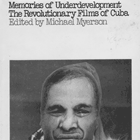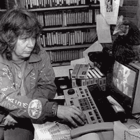Television Docudrama as Alternative Records of History
by Foluke Ogunleye Obafemi Awolowo UniversityI
From time immemorial human beings have sought to document their activities in realistic forms in order to pass across information about their lives to posterity. Even before the advent of cinematography, human beings had attempted to show life, not as static, but as dynamic. Cave paintings done by early men have shown an attempt to demonstrate movement through drawings of animals with many legs, designed to simulate motion. Also, attempts at showing moving images have included the shadow plays of North Africa and India, puppetry in many parts of the world, the pot art of India, etc. These activities presented the culture of the people and showed how icons are developed, what they stand for in the people's lives, and how people made meaning out of their lives and activities. With the development of the arts of cinematography and television, these also became vehicles to document happenings and events in the lives of the people.
In this study, I discuss the television docudrama as an alternative means of documenting history. There are many reasons necessitating an alternative source of documenting history, but two examples from Nigeria will suffice to justify this position. The powers-that-be in Nigeria have decreed that it is no longer necessary to study history in primary and secondary schools, and the subject has been removed from the curriculum. Consequently, if a Nigerian citizen does not go to a tertiary institution to study history, the past of her/his people will forever remain a mystery to her/him. Currently, there is a very lively debate in Nigeria about the origins of the Yoruba people. Traditional rulers, who are supposed to be the custodians of history, are at loggerheads with each other and with eggheads in history departments. The traditional rulers are bringing out diverse facts and evidence that differ from previously written histories. These two cases, while not proving that written histories are obsolete or irrelevant, have opened a case for alternative sources of history and alternative methods of documenting history. We cannot say the royal fathers are blowing hot air; they certainly deserve a fair hearing. We cannot say that the depths of historical knowledge should perpetually remain unplumbed by the cream of Nigerian youth; they deserve to know their past since they have to be part of the building of a future Nigeria. This then introduces our case for the docudrama as an alternative source of recording and disseminating historical facts.
II
The two most general film types are the story film and the non-story film. The non-story film comprises the bulk of experimental and many varieties of the "film of fact" (Kracauer 1961:175). The earliest film format to be associated with history is the non-story genre known as the documentary. Historians favor the documentary form because of their belief that it possesses the ability to present a truthful rendition of events as they occurred. However, the feature or story film has also been used in the service of history. There are two basic types of such feature films and they have been named to reflect an association with the documentary—the drama documentary and the docudrama.
The drama documentary simulates reality, and is used to analyze current events and issues. Drama documentaries are based on fictional events, which are derived from in-depth research, resulting in believable scenarios. Rosenstone (1995:30) has also described such dramas or films as "the historical romance." On the other hand, the docudrama is usually based on historical events, thereby providing an analysis of past proceedings (the freedictionary). The docudrama is the marriage of two unlikely forms—the documentary and drama. The documentary is a record of factual events. It is the story of 'something' or the process of 'something'. On the other hand, drama is the imitation of life—a contrived story. The docudrama can therefore be described as a hybrid genre.
The docudrama can also be described as a fact-based representation of real events. It utilizes the audio-visual formats of film and television and combines the elements of both the documentary and the drama. It uses both footages of real events and the talent of actors and actresses in performance to act out written stories, thereby gaining leeway to take dramatic liberty with events. The docudrama has great potential as an alternative instrument for historical records.
III
Since time immemorial, writers have combined fiction and history in creative works. A principal purpose of history in drama is to show us the past and the lessons we can learn from it to make our present better. Historical drama can be described as a form of drama which reflects or represents historical proceedings. The history play is also defined as "any drama whose time setting is in some period earlier than that in which it was written". We can go further to describe the history play as such "that reconstructs a personage, a series of events, a movement, or the spirit of a past age and pays the debt of serious scholarship to the facts of the age being re-created." Historical facts are then creatively adapted and made available in play form to the audience.
Lawrence Langner (1960:144-45; cf. Ogunleye 2004) has ascribed the following reasons for the popularity of historical drama: the desire of the theater-goer to spend an evening in the company of kings, queens, and other historical personages; the opportunity to be made familiar with far greater events than those which take place in the lives of ordinary people; and the fact that historical plays recreate great deeds done by great personages in the past.
For many decades in Nigeria, the Yoruba traveling theatre troupes provided the most popular form of entertainment for the generality of the public. However, after some time, socio-economic exigencies made it imperative to develop other art forms, and the theatre troupes branched off into cinematic productions. For years the Yoruba folkloric films held sway as the dominant entertainment form. The economic depression of the 1980s, however, swept away the economic base on which the film industry depended, forcing producers to look for cheaper forms of production. This led to the video film movement, which is the current rave on the Nigerian entertainment scene.
In all the movements cataloged above, the historical subject matter has always formed part of the dominant discourse. One of the first three popular practitioners of the traveling theatre was Duro Ladipo, who specialized in writing and producing historical plays. He used the stories of Yoruba heroes and heroines as source materials for his plays on stage and television. He was making plans to continue with the film format before his untimely death in 1978. Years after his death, the history play has become popular again with video film producers. The main reason for this popularity is the opportunity for producing pageants, which audiences dearly love. In these historical plays the producers present a glorious past, peopled by larger than life characters that are either fantastic heroes or incredible villains.
Another playwright who specializes in producing of historical plays is Akinwunmi Isola. Unlike Ladipo, Isola belongs to the literary tradition, being a professor of French and Yoruba languages at Obafemi Awolowo University, Ile-Ife, before his retirement. He wrote a play about a Yoruba female chief who died in 1874. He tapped from the popular tradition by giving the play, "Efunsetan Aniwura" to one of the traveling theatre troupes to produce. The play was a box office success and was later made into a film. Today in Nigeria, the greatest percentage of people who have knowledge of the eponymous heroine of the play, Efunsetan Aniwura, obtained their knowledge either from Isola's play or the film. It is immaterial that the version of his story differs markedly from written historical accounts, since historical drama can be described as basically fictional. This is because it basically utilizes "reality as historical context but does not claim that the primary plot line is representing events that have actually occurred" (museum.tv/archives).
We can say that historical drama is the precursor of docudrama. All the same, the docudrama improves on the historical drama through its use of actuality presented in recordings of events and locales where possible, and closeness to original stories. It endeavors to present a "fairly accurate interpretation of real historical events" (museum.tv/archives). It prides itself as being a non-fictional drama. It is also sometimes referred to as the semi-documentary. The genre presents a fusion, or an unlikely marriage between two diverse forms—the documentary, which is a form of truth, and the drama, which is make-believe or an imitation of life. The docudrama is a creative interpretation of reality (Lennson/Link 1977:138). Hood describes this genre as
[a] reconstruction with the help of actors of a documented and researched situation, either because it has historical import, . . . or because it was felt that it would be easier to deal with the subject in the controlled situation of the studio.
This form arose because of the desire of filmmakers during the postwar period in Europe to utilize the documentary format developed during the war in the commercial arena. Consequently, entertainment films were mixed with documentary materials. Docudramas are basically works of fiction, which endeavor to let in reality, and preferably center on topical or controversial issues. Due to its hybrid character, the genre requires a fusion of story and non-story elements difficult to reconcile (Kracauer 1961:259, Griffith/Mayer 1957:383). Most of these docudramas attempt to present a point of view to the audience, usually a religious, historical, or sociopolitical testament.
Akinwunmi Isola is also involved in the docudrama format. In the video production, "Agogo Eewo," for instance, he tells the story of a mythical town, Jogbo. In the docudrama, he portrays the political structure of a typical Yoruba primordial community. Through documentary and drama aspects, he describes how kings are chosen and the religious base on which societies depended. The video also makes use of diverse visual resources that bring to life the age in which the docudrama has been set.
IV
The methodological base for the docudrama was laid both by the documentary and the drama formats. Of utmost significance to us in this study is the importance of research. The life of the documentary format is derived from thorough research into the subject matter. This is because the audience is supposed to be educated and informed after watching the program. It is also very important for the documentary artist to be able to carry out in-depth research on the subject so as to produce a program that is informative. One of the functions of drama is to educate. So both the "docu" and the "drama" aspects must be informative and educative.
The focal point of the dramatic genre is verisimilitude. According to Aristotle, this is the ability of drama to be as close to nature as possible, painting characters in hues that make them appear as real and lifelike. Apart from the classical period the exponents of realism also regarded verisimilitude as an indispensable aspect of drama. This realistic portrayal of life is very important in the docudrama. Through the use of the camera, a realistic visual rendition of history can be made possible.
It has been established that visual sources are legitimate means of documenting history. The docudrama format is at an advantage in the sense that it has the ability to utilize diverse visual resources in synthesis to put across its message. For instance, the use of period costume helps to situate the period in whatever period the docudrama is addressing. The style of makeup, decorative masks, architecture, etc. are used to portray a sense of reality in the performance. Other visual resources include newspaper and magazine clippings, artifacts, paintings, graphics, and the like.
V
From the forgoing, we have established that the docudrama makes it possible for history to be made available to both scholars and laymen. It has the potential to enable the woman/man in the street to have an opportunity to become acquainted with her/his history. Some critics, however, have raised arguments against the docudrama format, and it is important to deal with these cases to enable the format live up to its highest potential in the service of history. One of the issues in question is that of "dramatic license," which is used to create materials that have not been established as historical facts or which are outright violations of known facts. This raises a problem that it becomes difficult for the audience to differentiate between fact and speculation. Finally, another case is that the docudrama possesses a tendency for hagiography or demonization in order to compress historical material into brief dramatic ambit (museum.tv/archives).
The accusations against the docudrama format are not unconnected with its hybridity. A conglomeration of the documentary, news, drama, and other formats has led to blurred boundaries separating the various formats. Suggestions have been made to overcome these perceived shortcomings of the docudrama format as an instrument for historical records. One is that the documentary content should be increased. Another recommendation is to use a narrator's voice to present factual information. Producers who seek to fuse the documentary and drama forms together sometimes do not succeed in closing the gap between the two forms. Consequently, we often have a mechanical, and rather clumsy mixture of actuality and fiction. Immense tact is required on the part of producers to fuse sucessfully these divergent modes of continuity of which the dramatic documentary necessarily consists (Kracauer 1961:251). An effective application of these and other suggestions would help in making the docudrama an important instrument for documenting history.
References
"Docu-Drama," 2004 http://encyclopedia.thefreedictionary.com/Docudrama.
"Drama Documentary," 2004 http://encyclopedia.thefreedictionary.com/Drama%20Documentary.
Griffith, Richard and Arthur Mayer. 1957 The Movies, New York.
Kracauer, Siegfried. 1961 Nature of Film, London.
Lennson, R. and W. Link. 1977 Stay Tuned. New York.
Langner, Lawrence. 1960 The Play's the Thing. Boston.
Ogunleye Foluke. 2004. "A Male-Centric Modification of History: Efunsetan Aniwura Revisited." HA 31:303-18.
Okhakhu, M. 1993. "Dramatic Genres on Nigerian Television" in H. Ekwuazi et al. eds. Studies in Film and Television. Jos.
Rosenstone, R. A. 1995 Visions of the Past. The Challenge of Film to Our Idea of History. Cambridge, MA
Back to Theory






